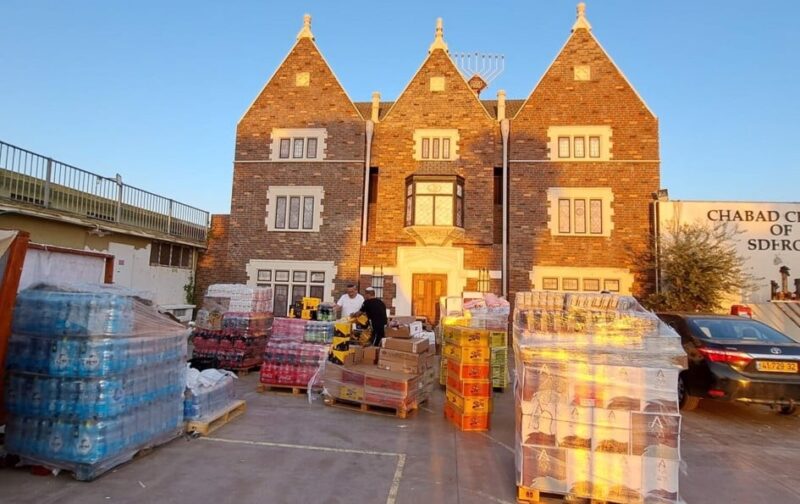
In Frontline City of Sderot, Chabad Serves as Beacon of Hope and Aid
by Noa Amouyal – chabad.org
The Israeli city of Sderot is by no means a stranger to tragedy.
Since 2001, more than 10,000 rockets have been fired at its civilians by Gaza-based terrorists. During the Oct. 7 massacre by Hamas, which left 1,400 Israelis dead, 4,500 wounded and as many as 240 kidnapped to Gaza—their fate unknown—terrorists infiltrated Sderot and slaughtered at least 45 people in cold blood, capturing a city police station for a period as well, and rendering the 100 rockets that landed in the city a mere afterthought.
In the aftermath of the Hamas attacks, Israel relocated some 200,000 people from Israel’s north and south. The mass evacuation of what’s known as the Gaza Envelope, which suffered the brunt of Hamas’s murderous rampage, has left its towns and villages nearly deserted.
With a pre-war population of 31,000, Sderot was once the Gaza Envelope’s largest city. Now, an eerie emptiness fills its streets, the usual soundtrack of people living their lives replaced by that of war just a few kilometers away, in northern Gaza.
However, not everyone has opted to stay in the hotels housing the displaced.
Of the roughly 6,000 people still residing in the beleaguered city, some are too old and weak to travel, some too sick and some are the brave and resolute few who have chosen to stay in their homes through thick and thin. There to assist the residents in acclimating to this new, disorienting reality is Chabad-Lubavitch of Sderot, which when the war began immediately sprung into action to provide for the community on a spiritual and logistical level.
To date, Chabad volunteers have collected and distributed more than 200 tons of food and helped feed 5,000 families, including soldiers, in the wider area.
“Our days here start early and end very late,” says Rabbi Asher Pizem, program director at Chabad-Lubavitch of Sderot, his voice rushed conveying information so that he can quickly move on to the many other tasks expected of him for the rest of the day. “It’s our duty to help every person we can. That is why we are here.”
Chabad of Sderot’s decades of work in the front line city will be honored this weekend at the International Conference of Chabad Emissaries (Kinus Hashluchim), which takes place in New York from Nov. 8-13.

Synagogue to Warehouse
Chabad of Sderot was established by Rabbi Asher Pizem’s parents, Rabbi Moshe Zeev and Sima Pizem, in 1985, and has long cared for the people of Sderot. In a society that at times feels fragmented, Chabad of Sderot, like Chabad throughout Israel, has served through thick and thin as a beacon of hope and aid for the broadest spectrum of the Jewish community.
In the first few days after the war, when terrorists were still on the loose in the south, the Pizems prioritized the spiritual well-being of the victims and helped organize minyans at funerals and attended many shiva calls.
Once soldiers began to mobilize on the border, Chabad activated more of its volunteers, and began providing the IDF with hundreds of pairs of tefillin and mezuzahs to ensure they’re not only battle-ready from a physical point of view, but a spiritual one as well.
In those days of chaos and uncertainty, many soldiers lacked basic equipment on the ground and Chabad stepped up in that regard, too, with the help of international donors securing the much-needed proactive gear for the soldiers before they entered enemy territory.
“As far as we’re concerned the people of the IDF and civilians are one,” the younger Pizem explains. “It’s our responsibility to give them everything they need.”
As a result, the next major component of Chabad’s massive operation involved converting the Chabad center to an essential item warehouse and shelter, whereby soldiers and civilians alike could come and get what they needed free of charge. Even in peaceful times, Sderot was one of Israel’s most impoverished cities, but since the war began most supermarkets and stores have been shuttered, making the food distribution not just a service, but a necessity.
A brief tour of Chabad’s facilities shows endless rows of boxes and cartons, transforming the Jewish center and synagogue into a one-stop shop where people can access anything they need to get through these difficult days.

Multi-Generational Affair
The Pizem family’s work in the city is a result of a multi-generational effort: Rabbi Moshe Zeev Pizem, Rabbi Asher Pizem and his 9-year-old son, Avrami, spend countless hours at the Chabad center each day ensuring everyone in the community has everything they need.
With many Israelis in reserves, the lack of manpower means that little Avrami’s help volunteering in their makeshift warehouse is actually needed..
“We only have a small handful of volunteers, but everyone that comes to help does a significant amount of work,” Pizem adds.
On most days, the Chabad volunteers receive shopping lists from families in need and diligently organizes cartons for delivery, while often wearing helmets and protective vests in case a rocket strikes too close. In fact, on October 9 a rocket landed in the courtyard of the Chabad center, barely missing the elder Pizem, who ran inside moments before it exploded.
Another challenge for the organization is the fact that southern Israel—although much quieter than in the beginning of the war—is still very much a risky place to be.
“Look, every time we go out and do something, we know there’s a risk,” Rabbi Asher Pizem says candidly. Sderot is so close to Gaza that citizens of Israel’s most targeted city know well that they have only 12-15 seconds to seek shelter. “Finding shelter in that little with your hands full of supplies is not easy.”
Pizem explains the scope of Chabad’s work in the city. “We’ve received an overwhelming amount of requests and it’s challenging to keep up with everything,” he says. “We’re not only helping Sderot residents, but other residents of the Gaza Envelope and soldiers who are stationed in the area. There’s a high demand. This is a difficult situation and we’re doing everything we can to make things a bit easier for people.”

Escaping a Nightmare
For those who can’t access the warehouse for physical reasons, that’s where volunteers like Sderot-native Racheli Lahav come in, eagerly bringing the desperately-needed items straight to people’s doorsteps.
Lahav is one of the Chabad volunteers helping to address the high demand. A high school history teacher during regular times, she is one of those intrepid souls who is sticking by her hometown and supporting others who have done the same, or are gradually returning.
“I would never judge anybody, of course, but I think it was a mistake to evacuate everyone en masse,” Lahav says, claiming that the hotel situation for many is chaotic and these Gaza Envelope communities should focus on rebuilding now.
“Everyone does what is right for them, but for me, this is my home and I won’t be intimidated to leave it,” she proclaims, adding that she’s already seeing signs of life trickle into the besieged town that has seen more than its fair share of trauma even before the October attack.

“I’ve chosen to stay here and volunteer,” Lahav said. “I think it’s important to provide support for this struggling community who have stayed behind, especially those who are weak and infirm.”
Lahav feels especially compelled to volunteer due to her near brush with death.
“We live in a garden apartment with two entrances. I was sitting in our front entrance when we literally had terrorists patrolling the area in the back of my apartment,” she recalls. “For some reason, I didn’t hear any commotion, and eventually, I went back inside and resumed the rest of the holiday as normal.”
Later, when she turned her phone on and saw the news of what had occurred around her and throughout the region, she began sobbing uncontrollably.
“I cried for a week; it just wouldn’t stop,” she says. “Eventually, I decided I couldn’t cry any more and needed to actually do something, not only to help my community but as a way to thank G‑d for sparing my life.”
Today, she works closely with the team of Chabad volunteers to deliver cartons of hot meals and medicine to residents across the south. From 2pm in the afternoon to the late evening, Lahav drives with her son to make deliveries at a rapid pace.
“Everybody here is going through one of the stages of grief,” Lahav adds. “For me, putting myself out there and boosting the morale of the people, rebuilding for the next day, is the only way to get out of this living nightmare.”

That’s been Chabad of Sderot’s motto for decades. Focus not on the darkness but on accomplishing good in your surroundings, always continuing to grow, thereby transforming darkness into light. Indeed, every year on Chanukah Chabad lights a giant menorah made of exploded Kassam rockets in its courtyard, where it sits for all to see the rest of the year.
“Every day, we pray that the war will be over,” says the elder Rabbi Pizem. “In the meantime, there is a lot of work to do.”














